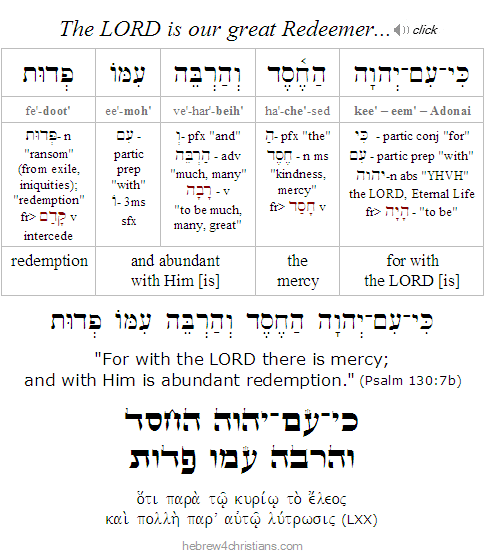|
The Divine promise was "I will bring you out (וְהוֹצֵאתִי) from under the burdens of Egypt" (Exod. 6:6), though later the people "romanticized" their captivity and wanted to return there to eat their "free fish" (Num. 11:5). The sages note the word "burdens" (i.e., sivloht: סִבְלת) can also mean "tolerance" (the related word savlanut, סַבְלָנוּת, means "patience" or "tolerance") which suggests that the people had tolerated their enslavement and made it "work" for them... Despite the hardship of their slavery, the Israelites rationalized their condition as being "normal" or acceptable.
There is no worse slavery than to be enslaved to your own heart and mind, to believe that you cannot escape or are not worthy to be redeemed. Is this not one of the devices of Satan - to blind our hearts to the truth of God's love for us? The "bringing out" (יְצִיאָה) of the LORD is therefore something more than the physical escape from the shackles of the body, but instead involves freedom (חֵרוּת) from the shackles of the mind. The most severe form of slavery is to not understand that you are slave, that is, to be asleep, full of vanity and illustion, as you imprison your own heart in the hopelessness of fate.
And are we not likewise at risk to be enslaved by the various comforts and deceptions offered up by this world and its principalities? Have we not likewise tolerated our own slavery -- our addictions to comfort, pleasures, a life of worldly propaganda and "free fish"? Are we really ready to leave all that behind to experience the glory of Zion? People may profess that they want to know God, that they "hunger and thirst for righteousness" and earnestly desire that the kingdom of heaven be manifest, and yet they can't get away from their favorite television shows, super bowls, political intrigues, pop idols, and other the fads of the day... We must be careful not to become comfortable in our exile – to become "friends of this world" – by losing faith's voice of protest; we must be careful not to be distracted from beholding spiritual reality and the ultimate healing to come. We are away from home, friends! When the hour comes and we hear "gemar ha'tikkun" – the great "it is finished" sound of the shofar summoning us all to follow Yeshua to the Holy Land -- will we be ready to leave everything behind?
The story is told by Abraham Twerski how Rabbi Nachum of Chernobyl once stayed at an inn, and as was his custom, he arose at midnight to recite lamentations over the destruction of the Temple and the exile of the people... The innkeeper, hearing his wailing, arose to see what the trouble was, and could not understand why the rabbi was sitting on the ground, mourning and praying... Nachum explained that we continually mourn the loss of our land and our exile, and that we cry out to God to hasten the ultimate redemption, when Mashiach will take us out of exile and lead us back to Jerusalem, our beloved Zion....
The innkeeper asked, "Will we all go to Jerusalem?" "Of course," Rabbi Nachum said. "But what will become of my little farm, my cows and chickens?" the innkeeper asked. "What account are these compared to our being in exile? Nachum replied. "We are repeatedly attacked by the Tartars, they carry out pogroms, killing and pillaging our people! In Jerusalem we will be free of such persecutions!"
The innkeeper was still not satisfied. "I must talk to my wife about this," he said. When he later told his wife what Rabbi Nachum said about the redemption by Mashiach, she said, "And how can we leave our farm and the cows and chickens that we worked so hard to get?" The innkeeper then explained how we would be free of the pogroms and persecutions of the bands of Tartars. The wife thought a bit and then said, "Go tell the rabbi that when Mashiach comes, he should take the Tartars to Jerusalem, and we can live here in peace."
There is hope, however, for all of us to be redeemed. Later in our Torah reading God said to Pharaoh, "I will bring about redemption (i.e., pedut: פְדֻת) between my people and your people (Exod. 8:23). The sages note that the word redemption (i.e., pedut) occurs three time in the Scriptures, explaining three types of exile. The first concerns the redemption from Egypt (יציאת מצרים), as mentioned above; the second refers to the remnant (שְׁאֵרִית) of the Jewish people redeemed in the days of Messiah: "He will send redemption to his people" (Psalm 111:9); and the third refers to the ultimate deliverance of the individual soul's bondage to his lower nature and evil characteristics. This is the "abundant" redemption mentioned in Psalm 130 - "for with the LORD there is the mercy, and with him is abundant redemption." This is the redemption that corresponds to the "abundant" life given in Yeshua our Messiah (John 10:10).
Hebrew Lesson
Psalm 130:7b reading (click for audio):
|



